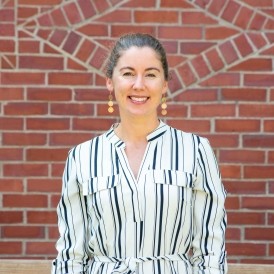
Alice Johnston
BA (Dalhousie), M.Ed. (University of Saskatchewan), PhD (Queen’s University)
Assistant Professor of Assessment and Curriculum Theory
Alice Johnston (she/her) is a settler scholar and an Assistant Professor in the Faculty of Education at St. Francis Xavier University. She completed her Ph.D. in Curriculum Studies at Queen’s University, where her doctoral research identified principles for decolonizing STEAM+ learning materials and examined how this work impacts both communities and institutions.
Before moving into academia, Dr. Johnston spent nearly a decade working in P–12 schools that primarily served First Nations and Métis students, including time spent working as a settler ally on the Indigenous Education Team in the Limestone District School Board in Kingston, Ontario. These experiences gave her valuable insight into how to support teachers in bringing Indigenous ways of knowing, being, and connecting with the natural world into their practice.
At St. FX, Dr. Johnston teaches undergraduate courses in classroom assessment and environmental education, as well as graduate courses in curriculum studies and research methods.
Dr. Johnston’s research program explores several areas within curriculum and education, including professional learning communities for climate justice education, the impact of land-based learning on STEAM+ education, the interplay between relationship building and student success, and decolonizing approaches to classroom assessment.
From 2020–2023, she served as Project Coordinator for the Queen’s University Indigenous Land-Based Learning STEM (QUILLS) Program, supported by an NSERC PromoScience grant. In partnership with Anishinaabe and Haudenosaunee community members from the Katarokwi (Kingston) region, the project produced five classroom-ready learning Bundles that center Indigenous land-based knowledge, integrate local scientific studies, and align with Ontario curriculum outcomes (see QUILLS project).
Dr. Johnston is also a co-applicant on a SSHRC Insight Grant, Climate Justice Education in Ontario: Creating and Sustaining a Professional Learning Community, which seeks to identify the pedagogies, activities, and resources that can create holistic, relational, and justice-focused communities of practice for climate justice education (Read more about the preliminary research informing this SSHRC funded project here). In addition, her research on classroom assessment examines how holistic approaches can be used to decolonize assessment practices and better meet the diverse learning needs of students.
Research Interests
- Climate justice education
- Land-based learning
- STEAM+ education
- Outdoor and environmental education
- Decolonizing approaches to teaching, learning and classroom assessment
- Curriculum theory
Refereed Contributions
Gyamerah, K., Mao, J., Johnston, A., Hodges, E., Pillay, T., Pashby, K. & Butler, A. (2025). Decolonial STEM education and the integration of a critical global citizenship education framework in an Ontario secondary school. Comparative and International Education, 54(1), 15-31. https://doi.org/10.5206/cie-eci.v54i1.19989
Decolonizing STEM learning through land-based education in Ontario: The generation of guiding principles and discovery of unanticipated outcomes. [Doctoral dissertation, Queen’s University]. QSpace. https://hdl.handle.net/1974/32729
Johnston, A. (2022). Taking learning outside. In K. Riley, J. McVittie & M.G. Boles (Eds.), Decolonizing environmental education for different contexts and nations (pp. 97-116). Peter Lang.
Johnston, A. & Claypool, T. (2010). Incorporating a multi-method assessment model in schools serving First Nations, Inuit, and Métis learners. Native Studies Review, 19(2), 121-138.
Non-refereed Contributions
Johnston, A. (2024, June 22). Land-based learning in the Limestone District School Board. Skeleton Park Press, 16(9), 9. https://skeletonparkartsfest.ca/wp-content/uploads/2024/06/SP_v16_FORWEB_4Jun2024.pdf
Johnston, A. & Davies, J. (2019). Understanding and mobilizing the inquiry into missing and murdered Indigenous women and girls calls to justice. The Knowledge Forum,1(2), 23-25. https://educ.queensu.ca/sites/educwww/files/uploaded_files/Research/Knowledge%20Forum/KnowledgeForum2019.pdf
Other Contributions
Johnston, A. (Production Manager). (2024). Deepening our understanding: Indigenous ways of knowing and being in the natural world [Film]. Pinegrove Productions. https://elbowlakecentre.ca/quills/deepening-our-understanding-indigenous-ways-of-knowing-and-being-in-the-natural-world/
Johnston, A. (Production Manager). (2024). Plants and animals as relatives: Threats to biodiversity [Film]. Pinegrove Productions. https://elbowlakecentre.ca/quills/plants-and-animals-as-relatives-threats-to-biodiversity/
Johnston, A. (Production Manager). (2024). Soil as relative: Carbon storage and global climate change [Film]. Pinegrove Productions. https://elbowlakecentre.ca/quills/soil-as-relative-carbon-storage-and-global-climate-change/
Johnston, A. (Production Manager). (2024). Threats to our relatives: Impacts of invasive species [Film]. Pinegrove Productions. https://elbowlakecentre.ca/quills/deepening-our-understanding-indigenous-ways-of-knowing-and-being-in-the-natural-world/
Elbow Lake Environmental Education Centre. (September, 2022). Accessible Trail, Interpretive Signs [Multi-lingual interpretative signage and trail app stations reflecting Anishinaabe and Kanyen’kehá:ka cultural heritage at the Elbow Lake Environmental Education Centre]. 1500 Hewlett-Packard Lane, Perth Road, ON, K0H 2L0. https://qubs.ca/news/2022/10/01/new-indigenous-interpretative-signs-elbow [Project Manager]
Elbow Lake Environmental Education Centre. (n.d.). Queen’s University Indigenous Land-Based Learning STEM (QUILLS) Program. https://elbowlakecentre.ca/quills/ [Program Developer and Coordinator]

